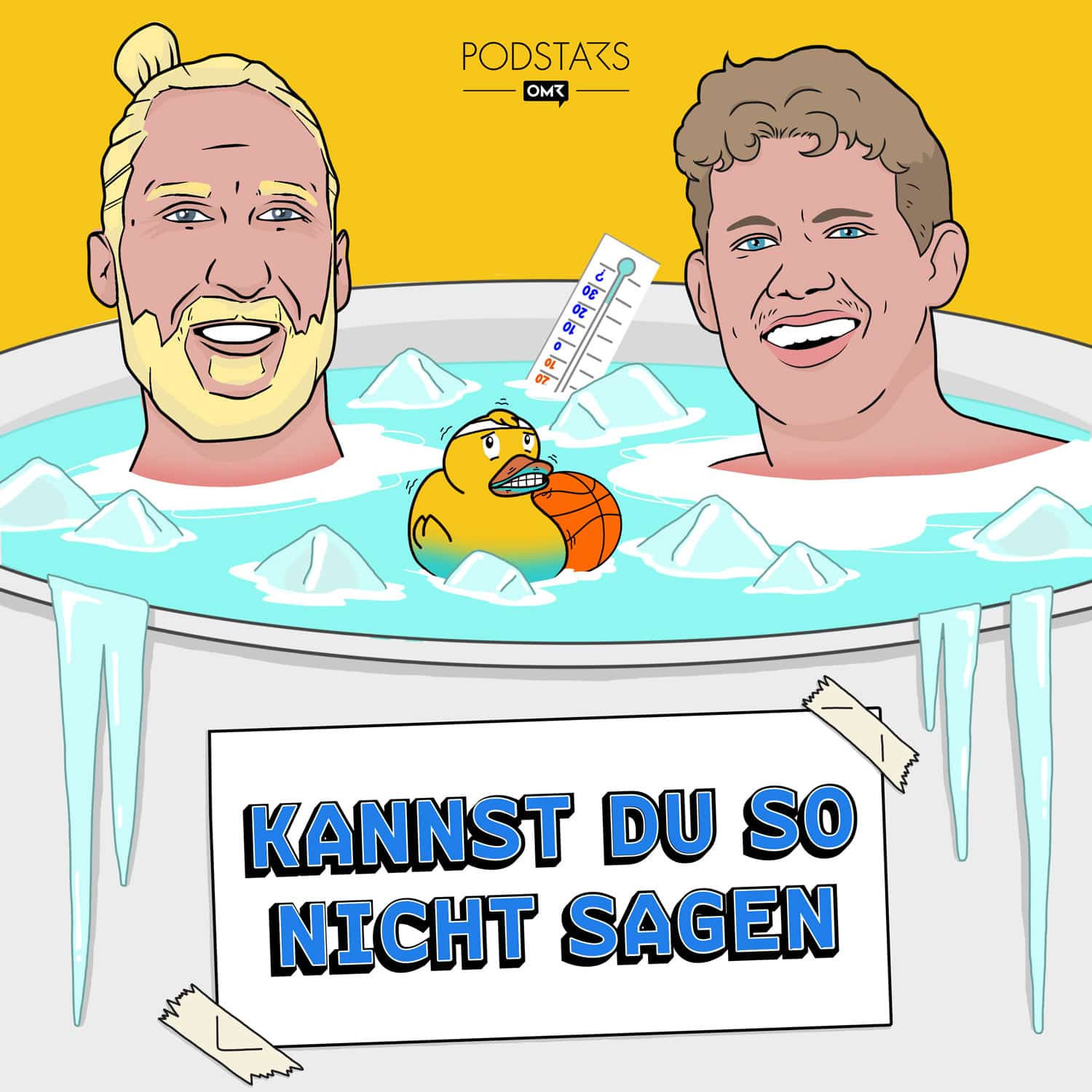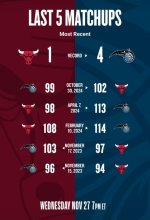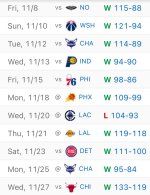Jalen Suggs, Wendell Carter Jr.’s special friendship sets tone for Orlando Magic
Jason Quick
Nov 26, 2024
53
Over the past four years, the
Orlando Magic have been aware of a budding friendship between point guard
Jalen Suggs and big man
Wendell Carter Jr.
“Those two have a great relationship,” forward
Paolo Banchero said. “Ever since I’ve got here, they have that best-friend type of thing, where they are always joking, always messing with each other, always showing love for one another. It’s been dope to see.”
On Nov. 3, in a game at Dallas, the rest of the
NBA saw just how deep that bond runs between Suggs and Carter.
Overwhelmed with frustration after suffering another injury, Carter broke down in the second quarter and cried on the Orlando bench. He not only cried but sobbed, his chest heaving, his eyes swollen. And there beside him was Suggs, covering his friend’s head with a towel, wrapping an arm around his shoulder to comfort, and whispering advice in his ear.
“Just love,” Suggs said.
Added Carter: “He’s a guy you want on your team, but even more so, he’s a guy you want as your friend.”
What happened in Dallas went deeper than a friend consoling a buddy who was down. There is history behind the emotions and meaning behind the reaction. The scene on the bench was emblematic of what has made the Orlando Magic perhaps the most different culture in the NBA, one that trumpets caring about one another while stressing mental-health awareness, togetherness and transparency.
“We can’t talk about being special if we don’t treat each other special,” coach Jamahl Mosley said. “We can’t talk about being unique and doing something different if we are not unique and different. And what you saw there … that’s who this team is.”
The closeness of the Magic, Mosley believes, is part of the reason Orlando is 12-7 despite injuries causing All-Star Banchero to miss the last 14 games and Carter the last 12 (Carter is nearing a return). Sure, it helps that
Franz Wagner is the NBA’s biggest breakout star, that Suggs is an All-NBA defender and that second-year guard
Anthony Black is becoming a reliable burst off the bench. But inside the Magic locker room, they talk about how their communication, compassion and care form an invaluable intangible.
So while the scene in Dallas, with Carter sidelined and distraught, was a setback because the Magic were losing their center who entered the game averaging 10.4 rebounds, it also was empowering because it showed the unspoken power inside this roster.
Arnie Kander, Orlando’s vice president of player performance and wellness, said he could feel that power at the moment. As he approached the emotional Carter being consoled by Suggs on the bench that night in Dallas, he said his heart swelled.
“I remember thinking, the healing is starting … the healing is literally starting right here in this moment,” Kander said.
It is fitting the spotlight of relationships between Suggs and Carter comes from a moment of despair, with an injury as the backdrop.
The seeds of their friendship were planted while both were injured during Suggs’ rookie season in 2021. With Suggs rehabilitating a thumb injury and Carter sidelined with a hamstring injury, the two spent much of December and January in the training room. They did more than just rehabilitate their bodies. They found a connection that also healed their minds.
Suggs said he was spiraling emotionally after his injury. He felt the weight of being the fifth pick and not delivering on expectations. Carter could relate. After a variety of injuries held him back early in his career, the
Bulls traded him to Orlando two and half seasons after drafting him seventh in 2018.
So as the Magic practiced, Suggs and Carter would be in the training room, working on their bodies and minds. They would talk about their anxieties. Their fears. They talked about solutions. Dreams. And, they talked about their faith in God.
“I will always hold our relationship close to my heart because of the time it came,” Suggs said. “It was a really vulnerable time for me … I was just not in a good mental space. I was worried about making it in the league, whether this was for me, if I wanted to be here … I just had a lot of struggles those first two years in terms of finding myself, not only in basketball but as a human. But I knew, every day I got to wake up and go to work and see Wendell. He was a bright spot that I had in my day.”
Suggs found that Carter was a great listener, and always chose the right advice and the right time to deliver it. Carter found that Suggs, who is two years younger, was exceptionally grounded for his age, and he liked that Suggs was more drawn to family and faith than money, fame and cars.
“At the end of the day, this is a job, and having someone you can talk to, relate to, it makes coming to work easy,’’ Carter said. “It’s special to have that.”
Added Suggs: “I think the best part about Wendell is that we can go from laughing and joking to having a really intimate conversation about life, hardships and the obstacles we’re each facing. And it’s really authentic. It’s not him sharing clichés. I can tell he is listening to me.
“So in my time of need, he was there for me,” Suggs said. “And when people are there for you, it means a lot.”
In Dallas, it was time to reciprocate.
It was midway through the second quarter in Dallas on Nov. 3 when Carter leaped to deflect a lob pass at the rim. When he landed, he instantly felt pain, like a thousand pins piercing his foot. He knew immediately it was a case of plantar fasciitis.
It was a particularly deflating development because Carter had worked so hard to squash the injury bug that had defined his first six NBA seasons. With injuries to his knees, feet, eye, back, hand, hip and hamstring, Carter has missed more than one-third of his games over his career because of injury.
“I’ve been battling injury my whole career, and most of it is stuff I can’t control,” he said. “It was frustrating because I went into that game already banged up (knee soreness) …and when it happened, I knew exactly what it was.”
Incidentally, on the play Carter was injured, Suggs soared behind him and made a spectacular block of
Daniel Gafford, who had caught the lob pass over Carter and was attempting to dunk. Suggs was substituted out of the game after the play, but as he took a seat on the bench, he noticed Carter was limping heavily.
“He wasn’t moving well … I could tell something wasn’t right,” Suggs said. “But because the way Wendell is, he doesn’t want to show weakness on the court, he won’t let you know he is hurting. But seeing his movements, he didn’t look comfortable.”
Carter played for another minute, but Suggs couldn’t take it anymore. He went to Mosley on the sideline and urged him to take Carter out.
As Carter limped to the sideline, he knew his injury was serious. All of his hard work over the summer, all of his goals … they were washed out, flooded by the pain. As he looked for a seat on the bench his mind was reeling.
“I was getting super emotional … like, not again,” Carter said. “One of my goals was to play all 82 (games), and to be stopped so early in the season was frustrating.”
By the time he plopped on the bench, his emotions were winning. Suggs could tell by Carter’s face that he was about to cry. So he got a towel and covered his friend’s head to give him some privacy as his body heaved and his tears flowed.
“I’m glad he cried, glad he let out tears,” Suggs said. “I think it’s important to have those moments. In those moments you know you are still human. And it shows he is one with himself. In that space, in front of 17,000 fans, he was still authentically him.”
That moment of vulnerability, was in part, fostered by the culture Mosley is forging in Orlando.
In the past couple of seasons, Mosley has used a team-building tactic introduced to him by veteran Magic guard
Cory Joseph: A player brings in a photograph that means something to him, and he talks to the team about why the person in that photo is special, or why the picture means something to him.
“I just think it’s beautiful because it’s helps your ability to get to know the people you are around, beyond the surface level,” Mosley said. “Everyone says, ‘This is my guy … you are my guy …’ but I don’t want that to be lip service.”
In conjunction with the photo sessions, Mosley harps to his players about the team being a family, and about the importance of that family communicating when things are awry.
“I tell them all the time, if you have something going on, let’s talk about it,” Mosley said. “My door is open, your teammates’ door is open. If it’s enough to put on the table, we’ll put it on the table and talk about it. We’re human beings, and we all go through things, so why not be able to address it and say, ‘I’m not any less if I address this and say I can’t handle it …”
Communication is at the center of the team’s push to foster an environment where mental health is not only addressed but also valued. They also do meditation and breathing exercises, all while stressing their mantra: this is bigger than basketball.
“We talk about mental health, spiritual health, but I don’t think it gets seen enough,” Kander said. “Because that’s what these guys represent. They’ve been taught to have this bravado, be macho, but strength as we know it is the complete package. It’s about who we are as a human being.”
In that vein, Carter said he didn’t hesitate to show his hurt, to express his frustration, and to release his tears, no matter that it was in front of 17,000. Surrounded by his friend, and his team, he felt comfortable.
“Coach and the front office has created an environment where we can be like that,” Suggs said. “We can be authentic, exactly who we are and show exactly what we are feeling. It’s such a freeing feeling, honestly. When you can do that, and be that, and not put on any front or facade, it’s comforting. You can just be yourself, be a human being and know that the man next to you will take care of you in those moments.”
As Carter sobbed on the bench, his face buried in the towel Suggs provided, his friend leaned in and comforted him.
“He made it all make sense,” Carter said.
It was like they were back in the training room three years ago, confronting their fears, easing their anxieties and leaning on each other.
“The main thing in that moment I wanted Wendell to know was that not only is he strong, he is so much more than a basketball player,” Suggs said. “I told him, the things he has done as a human being — not only for myself, but for his family, for the people in Orlando, for his foundation … he’s been amazing.”
Every Thanksgiving in Orlando, Carter provides meals for families. This year, he expects to feed 300 families. And for Christmas, he is rewarding standout students at Orlando high schools with iPads and gaming consoles. His foundation also has a program to help inspire students to consider a career in aviation, spawned from his childhood infatuation with flying after a visit to a cockpit.
“I’ve done about four off-the-court community service events with him,” Mosley said. “He has one of the best hearts of anyone.”
As Carter began to regain his composure on the bench, Suggs continued to lean in and speak into his ear. He knew how obsessed Carter had become over the summer working on his body, and how much emphasis he had put on being healthy the entire year.
“I told him this is an amazing opportunity to slow down and really center yourself,” Suggs said. “Injuries are such a hard thing. They often cloud your judgment … they make you ask the question why?”
Carter said the words began to calm him.
“And as he comforted me, he prayed over me,” Carter said. “Then he started talking about our faith, a lot of spirituality stuff, and it made me look at it differently in that moment.”
Said Suggs: “I told him it’s hard to see God’s plan in the moment. And while you feel heavy in the moment, you are going to look back at this time and you are going to realize God was teaching you the whole time. It really turns into a beautiful thing when the process is over. So I just told him that. You are going to see what He is teaching, you are just going to have to trust Him.”
Three games later, the roles were reversed. Suggs was ailing, and Carter was there for him.
When the Magic returned home, they faced New Orleans. Suggs felt off. He was exhausted, sluggish, and his mind wasn’t moving as fast as the action on the court.
During a timeout, Suggs was on the back edge of the huddle and Carter approached.
“He was like, ‘Hey bro? You OK?’” Suggs said, lowering his voice to mimic Carter. “It may seem like a subtle thing, that question, but because Wendell and I have that relationship, we can really have a conversation.”
As Mosley talked X’s and O’s inside the huddle, Suggs and Carter were on the outskirts, talking about Suggs’ headspace.
“I told him exactly what I was going through,” Suggs said. “I told him, ‘No, I’m not OK. I’m tired. My energy is low. My spirit is down, and I’m not exactly sure what to do. It feels like a time when I’m not really in control.’”
Carter flipped the advice Suggs gave him in Dallas back at him. He told him to take the time to figure it out, that not everything has to be accomplished at this moment. He told him that the team knows who he is as a player, and that he didn’t have to do everything himself. They were all here for him.
Even though Suggs had a subpar game against the
Pelicans with seven points, six assists and five turnovers, the Magic won 115-88.
“Instead of trying to answer questions from within and battling my own mind, I was able to release them to Wendell and put those feelings on his shoulders a bit and get some insight and love,” Suggs said. “Just to have that release … that’s really comfortable.”
On a recent trip to Los Angeles, Suggs and Carter continued their rivalry of playing online games. Their favorites are Connect Four and Mancala. On this day, Carter delivered three consecutive beatdowns in Mancala, prompting him to text Suggs a dancing Hulk emoji.
“That wasn’t funny,” Suggs deadpanned. “I know he got a great laugh out of that, but I was not laughing. Three straight L’s. I needed time to simmer down after that.”
By nightfall, Suggs had cooled, and the two went to watch the horror/suspense film “Heretic.” “Verrrrry interesting, I will just say that,” Carter said of the movie.
The next morning, as the team met to go over the game plan against the
Clippers, assistant coach Dale Osbourne was giving his report when he used a phrase that Suggs and Carter found humorous.
“I’m looking straight ahead, and I can feel Jalen’s presence,” Carter said. “I turned and looked and he’s just staring at me. We both started laughing.”
Around the Magic, one thing is almost certain: If Carter is laughing, then almost assuredly, so is Suggs.
“You know how you have those people when you look at them, you just want to laugh?” Suggs said. “Wendell is one of those people. And he has one of the funniest laughs I’ve ever heard. It’s high-pitched and his whole face cracks up … so when he laughs, I laugh, and that energy just feeds off each other.”
Their friendship rolls on, one laugh at a time, one crisis at a time, one moment a time. Along the way, they are unafraid to confront their fears and be themselves, knowing that they have someone who will be there for them if they waver.
“Those two for sure have a very special, unique relationship,” Kander said. “Both guys are soul-searchers, they want to dig a little deeper.”
Perhaps that is why Carter recalls fondly a set of 30 cards that Kander has players blindly select each day. The cards have symbolic/spiritual sayings … something along the thoughts of the day. On the night he was injured in Dallas, Carter selected his card
It read: “I’m safe.”



